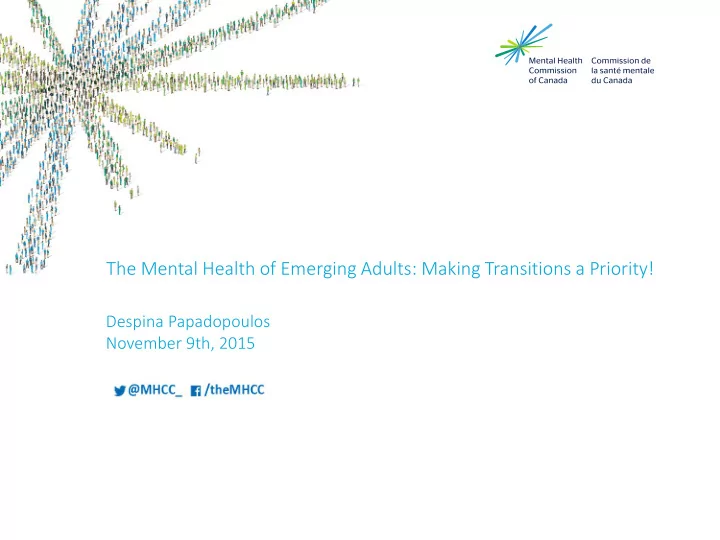

The Mental Health of Emerging Adults: Making Transitions a Priority! Despina Papadopoulos November 9th, 2015
Mental Health Strategy for Canada • The Mental Health Strategy for Canada outlines a number of recommendations for action on child and youth mental health. • In particular, to better serve emerging adults, it recommends the removal of barriers that can prevent successful transitions from child and youth to adult mental health and addiction services. • Strategic Direction 3.3.5: “Remove barriers to successful transitions between child, youth, adult, and seniors’ mental health services.”
Taking the Next Step Forward • Collaboration with a research team from the Children’s Hospital of Eastern Ontario (CHEO). • Executive Summary of Taking the Next Step Forward: Building a Responsive Mental Health and Addictions System for Emerging Adults was released in January 2015. • The full source document was released on September 17, 2015.
Proposed Report Recommendations National, Provincial/Territorial and Regional recommendations: • National: Proposed Continuum of Mental Health and Addiction Services for Emerging Adults: A tier based approach • Provincial/Territorial: EA as a priority in mental health reform and action plans • Regional: Core Basket of Services (8) Visit our webpage to download the report: www.mentalhealthcommission.ca/English/issues/child-and-youth
The Consensus Conference on the Mental Health of Emerging Adults: Making Transitions a Priority in Canada • When: November 2-4, 2015 in Ottawa, Ontario • Audie ience: Emerging adults, caregivers, policy makers, researchers, mental health organizations, and clinicians from across Canada • Engagement: Conference Advisory Group and Emerging Adults Advisory Group Eng • Con Consensus Form ormat: Following a jury trial format, the conference builds upon evidence-informed practices and policies in order to garner consensus around specific and actionable policy recommendations in a short amount of time. GO GOAL: To generate recommendations that advance policy and practice in the area of youth transitioning from child and youth to adult mental health services.
Conference Themes & Questions Building on these aims and goals, the consensus conference policy themes are: 1. Defining emerging adulthood as a stage of life 2. Bridging the gap between child and youth and adult mental health services 3. Transitions across service systems 4. Mechanisms for improving mental health system responsiveness
Proposed Principles 1. All emerging adults across Canada have equal access to high-quality, publicly funded mental health care. 2. The culture of the system is one of hope, collaboration and integration. 3. Emerging adults are engaged as experts. 4. Indigenous knowledge, systems and practices are fully integrated where they are needed. 5. Services are client- driven and cover the full range of a person’s needs. 6. The mental health care system is flexible.
Proposed Principles 7. Services are locally, culturally and personally relevant. 8. Emerging adults with mental health needs have access to supportive peers and professionals they can relate to. 9. Services respect the individual and create a sense of community and belonging. 10. Services are highly responsive to the needs of all vulnerable people. 11. Conference delegates urged that the principles also acknowledge current racial and other forms of inequity experienced by emerging adults.
Next Steps for the MHCC • Working with the Consensus Conference Jury, the KEC will disseminate the consensus document in order to advance policy and practice for EAs and help to further the conversation about EAs in Canada. • Ensure that the consensus statement has been communicated across Canada to diverse audiences, including, and most importantly, local and provincial policy makers.
THANK YOU! Despina Papadopoulos, Knowledge Exchange dpapadopoulos@mentalhealthcommision.ca #MHCC
Recommend
More recommend